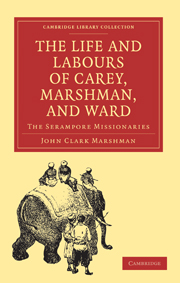Summary
Lord Cornwallis landed in Calcutta a second time in 1805, at the age of sixty-six, after his mental and bodily energies had been exhausted by thirty years of incessant service in America, India, and Ireland, and with the finger of death on him. He hastened to the north-west provinces immediately on his arrival, but died within two months at Gazeepore. He was succeeded in the government, provisionally, by Mr, afterwards Sir George Barlow, a civilian of twenty-seven years' standing, a mere plodding man of routine, without a particle of that mental power which the administration of the empire required. Under the influence of Lord Wellesley's master-spirit, he had freely supported those liberal views which marked his government; but when relieved from this superior influence, his feeble and irresolute mind came under the control of the anti-liberal and anti-missionary party, and the prejudices of the “old Indian” school regained their ascendancy in the Council Chamber. The difficulties of the missionaries date from his accession to power; and the storm of opposition to which they were exposed raged with more or less violence throughout eight succeeding years, until Parliament took the decision of the missionary question into its own hands.
In their direct missionary labours, they experienced great alternations of disappointment and success. In March, they regret “the low state of things; no inquirers, no new converts.” Every inquirer had left them clandestinely. The misconduct of some who had embraced Christianity, and the profligacy of others, brought odium on the cause in the eyes of the heathen, and damped the spirits of the missionaries.
- Type
- Chapter
- Information
- The Life and Labours of Carey, Marshman, and WardThe Serampore Missionaries, pp. 101 - 133Publisher: Cambridge University PressPrint publication year: 2010First published in: 1864

